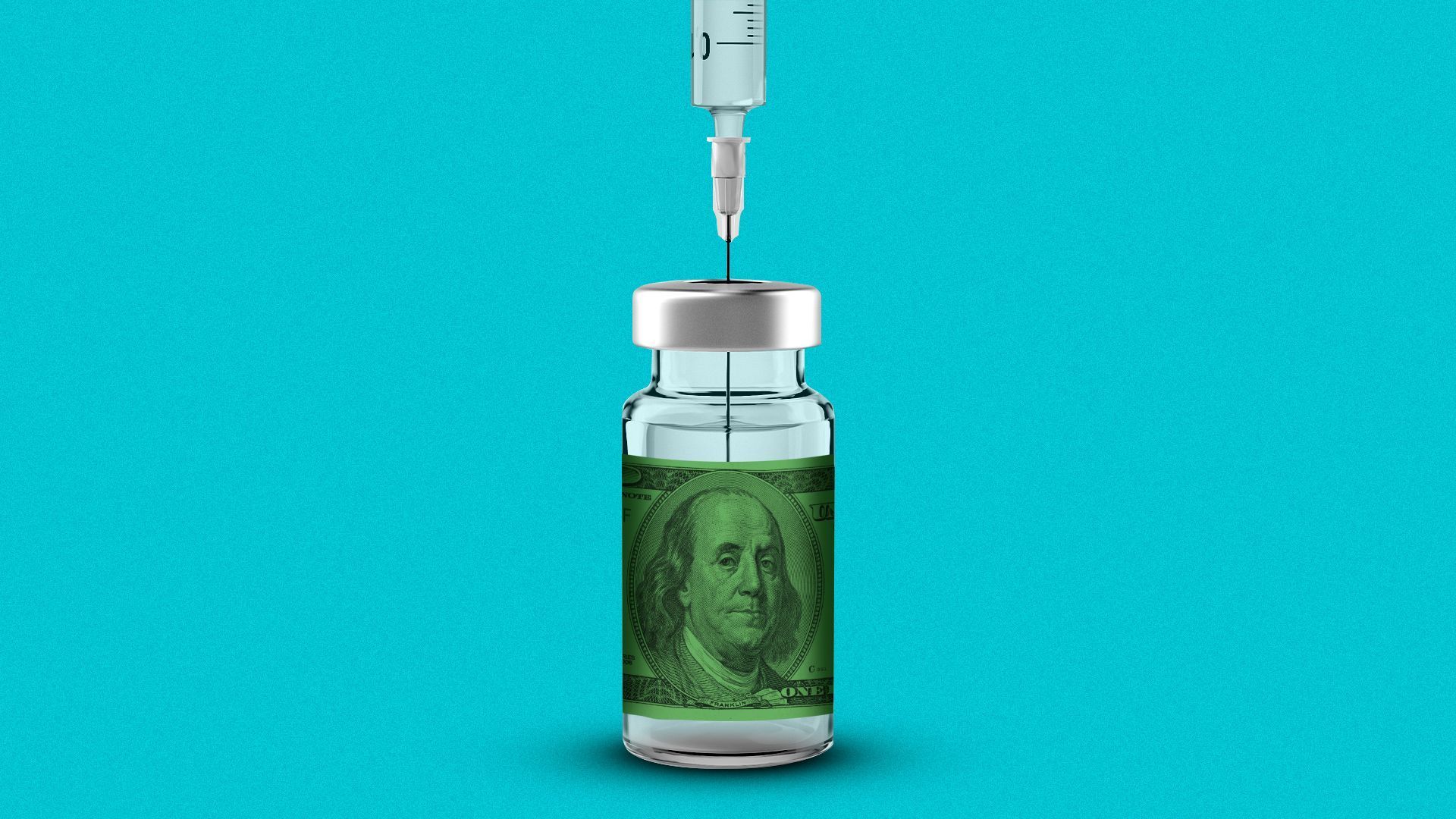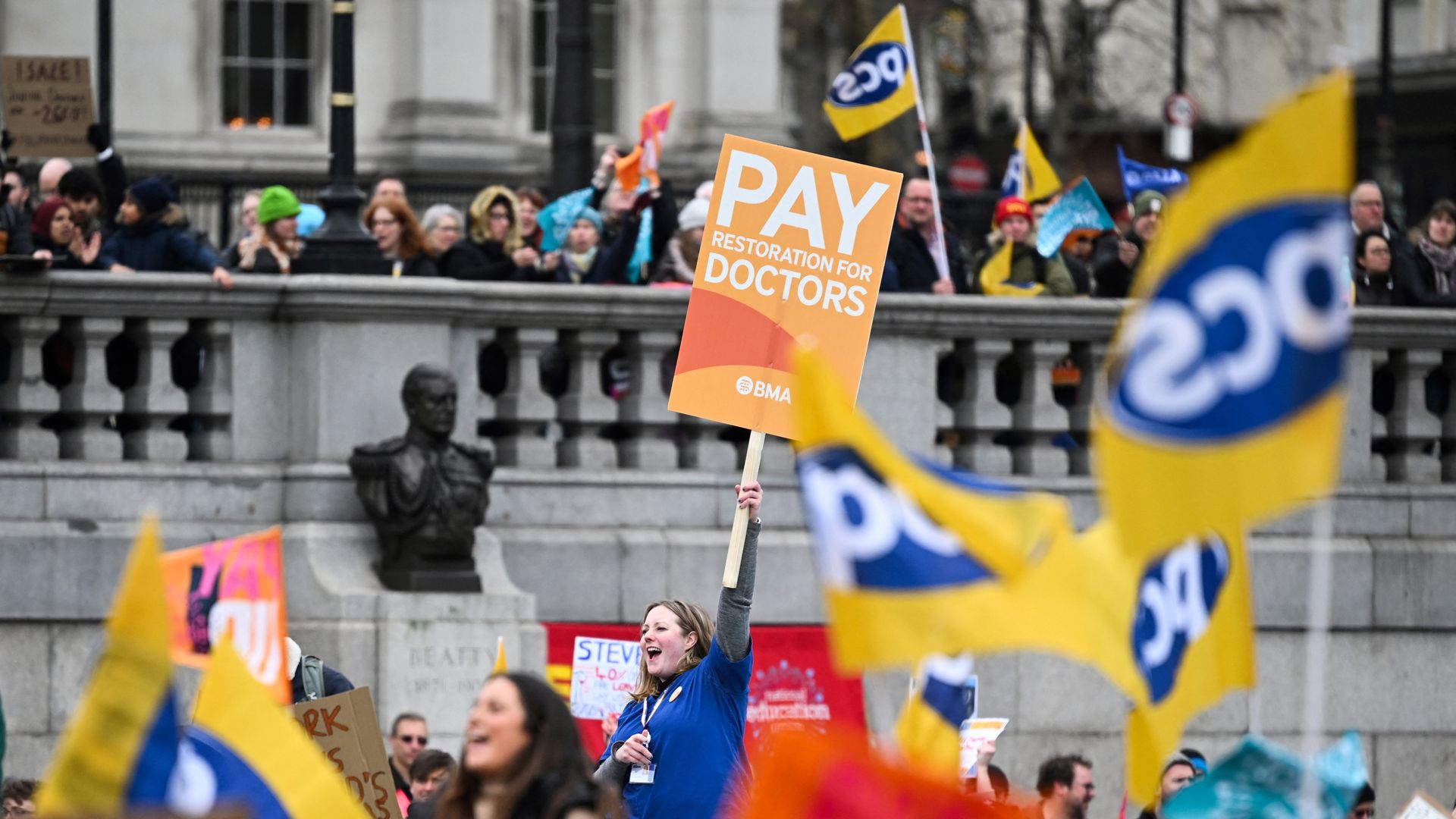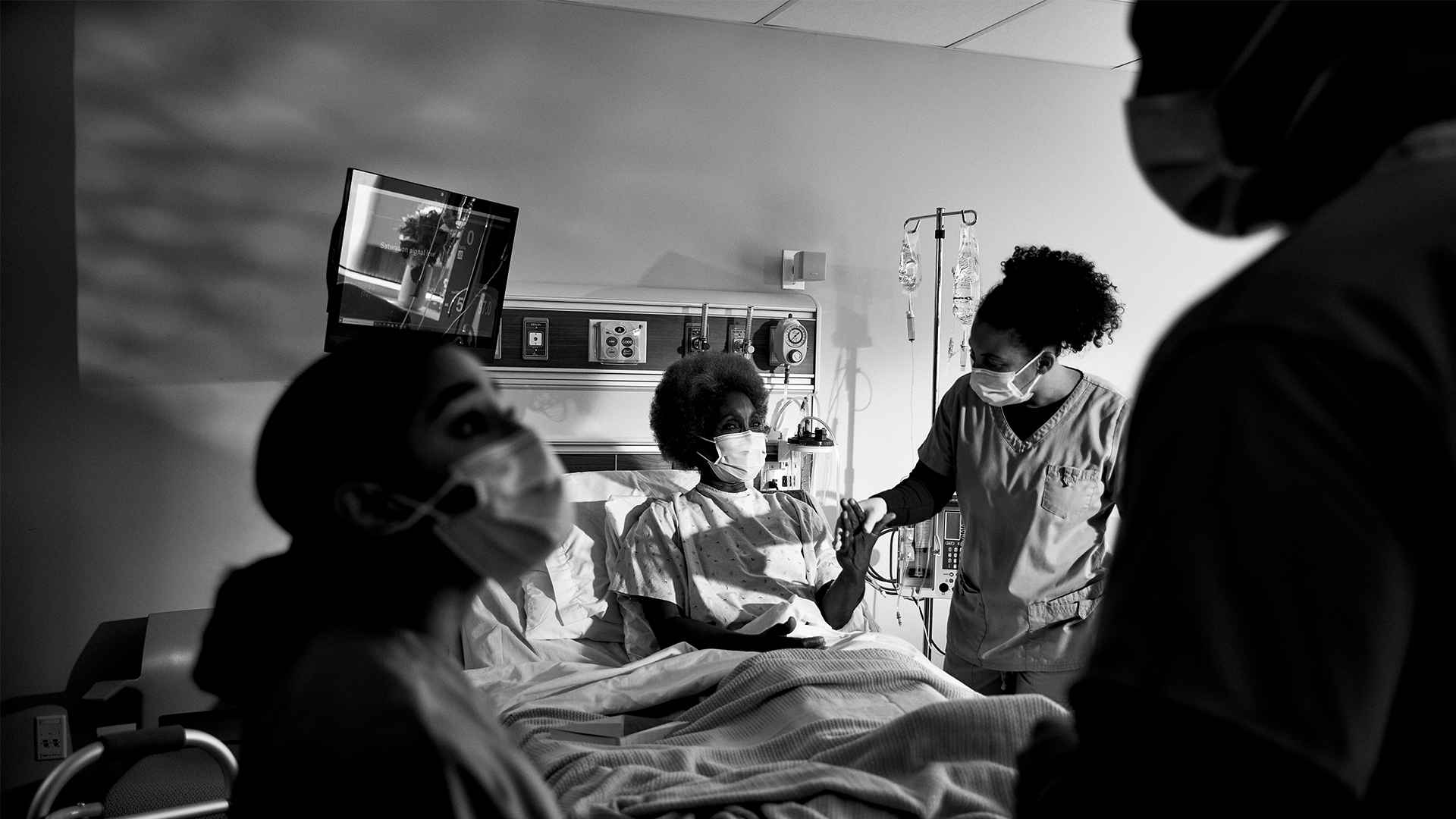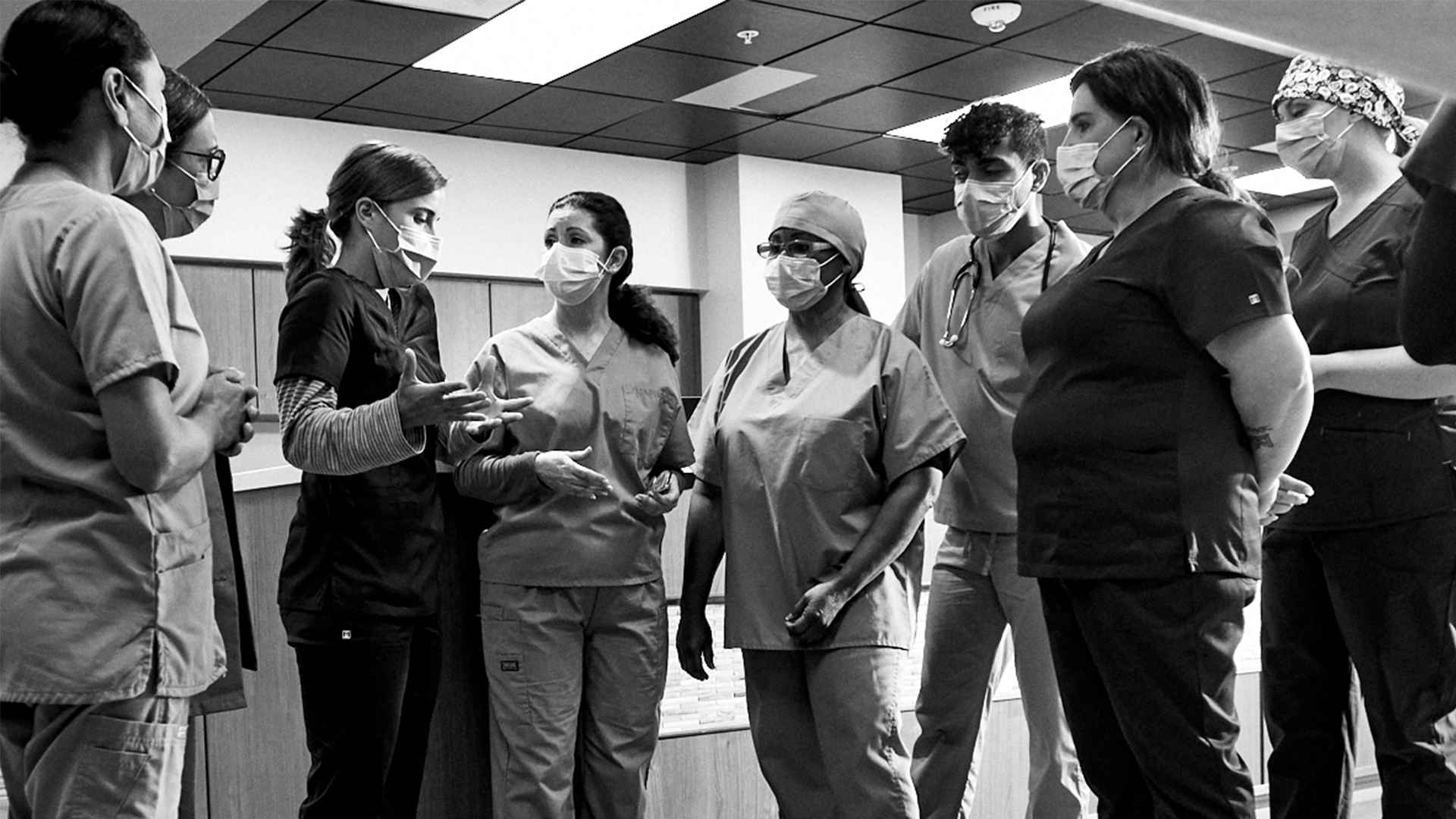| |
| |
| |
| Presented By HCA Healthcare |
| |
| Axios Vitals |
| By Tina Reed · Mar 17, 2023 |
| ☘️ Happy St. Patrick's Day, Vitals readers — and Happy Residency Match Day to all the medical residents out there! Today's newsletter is 1,073 words or a 4-minute read. Mark your calendars: Join me and Axios' Adriel Bettelheim on Thursday, Mar. 23, at 8am ET in Washington, D.C., for an event exploring how the U.S. can improve its public health preparedness. - Guests include HHS' Asst. Secretary Dawn O'Connell, the Bipartisan Commission on Biodefense's Asha M. George, and Johns Hopkins Center for Health Security director Tom Inglesby. Register here to attend in person.
|
| |
| |
| 1 big thing: Paxlovid questions linger as full FDA approval nears |
 |
|
| Illustration: Gabriella Turrisi/Axios |
| |
| Pfizer's antiviral Paxlovid is one step closer to gaining full approval from the Food and Drug Administration, but whether that convinces more doctors to prescribe it is an open question, Axios' Sabrina Moreno writes. Driving the news: Vaccine advisers to the FDA voted 16-1 yesterday to endorse Paxlovid for high-risk COVID-19 patients, but experts later said there's not enough data to determine precisely who would benefit most from the drug. - That poses a dilemma for physicians who — in addition to considering drug interactions and how the virus has evolved — also have to weigh factors like Paxlovid's effect on pregnant and immunosuppressed people and other vulnerable populations.
Catch up quick: Many doctors are already hesitant to prescribe the drug, either because of possible side effects like muscle pain or altered taste, or out of a belief that a patient is not sick enough. - And there are longstanding questions about how well the drug, once hailed as a pandemic "game-changer," works on vaccinated patients or younger people.
- Limited public awareness and perceptions that the pandemic is over have also led fewer people to ask for it.
The circumstances could hamper efforts to ensure Paxlovid gets to those who most need it, even if full FDA approval boosts public acceptance and uptake. Go deeper: Almost 12.7 million courses of Paxlovid have been distributed, according to the Department of Health and Human Services. - But demographic breakdowns aren't publicly disclosed, making it difficult to know who's getting it.
- In some states, Paxlovid is being prescribed in less than a quarter of COVID cases, per a January analysis of White House data from The New York Times.
- A CDC study last October found Black and Latino patients were as much as 36% less likely to be prescribed the drug than white patients even when they were immunocompromised.
- And Test to Treat sites aimed at helping hard-hit communities access Paxlovid were often not accessible to rural residents and others most in need, according to a November report from Brigham and Women's Hospital.
What's happening: "There's not a good understanding [of Paxlovid] among the medical community" leading to an "actual dissuading of patients from taking an effective and safe drug that could save their life," said Sankar Swaminathan, an FDA panelist and infectious disease specialist at the University of Utah who voted to recommend full approval. Go deeper. |
    |
| |
| |
| 2. Pharma lowers insulin costs to save money |
 |
|
| Illustration: Aïda Amer/Axios |
| |
| The biggest U.S. insulin manufacturers have each committed to lowering the cost of their products — a move that will save them money by lowering the amount they'd otherwise have to rebate Medicaid, Axios' Oriana Gonzalez writes. Driving the news: Sanofi yesterday said it plans to cap out-of-pocket costs for its most prescribed insulin, Lantus, at $35 per month for people with private insurance, following similar steps from Eli Lilly and Novo Nordisk. - Eli Lilly earlier this month also committed to $35 per month. Novo Nordisk said it would lower prices by 75%, with its lowest price at $48.20.
The big picture: The companies were facing pressure from President Biden and some in Congress to cap out-of-pocket insulin costs, after the Inflation Reduction Act limited monthly costs of the medicine for Medicare beneficiaries. Be smart: The companies said that they decided to lower costs to ensure that patients could afford their medications. But Novo Nordisk and Sanofi's changes kick in on Jan. 1 and coincide with the elimination of a cap that limits how much manufacturers have to rebate Medicaid. - Eli Lily is avoiding paying around $430 million per year in new Medicaid rebates and Novo Nordisk would save $350 million, Spencer Perlman, the director of health care research at Veda Partners, told Bloomberg.
|
    |
| |
| |
| 3. Nurses, ambulance workers reach deal in England |
 |
|
| Photo by Justin Tallis/AFP via Getty Images |
| |
| Nurses, ambulance crews and health care workers — other than doctors — reached a pay deal in England yesterday, ABC News reported. Why it matters: It came amid days of crippling labor demonstrations by different British trade unions, including teachers, London Underground train drivers and civil servants, after Britain's finance minister unveiled his tax and spending plans. - While unions in England representing NHS nurses, ambulance, staff and other health workers agreed to a pay raise, junior doctors accepted a proposal to discuss wages while suspending further strikes, the Financial Times reported.
Catch up quick: Health care workers across the globe have been taking labor action over pay and work conditions coming out of the pandemic, with strikes occurring in Britain, Scotland, France, Germany and Spain in recent months. - In Spain, primary care doctors and pediatricians and the government signed an agreement yesterday ending strikes that have been going on for almost four months.
- Earlier this week, a South African court ordered striking health care workers to end a week-long walkout, according to Reuters. Health care workers across Germany also reportedly held a two-day walkout.
- Doctors in Scotland warned this week they may also strike.
|
    |
| |
| |
| A message from HCA Healthcare |
| What advancing health equity looks like |
| |
 |
| |
| HCA Healthcare provides high-quality care for every patient we serve. An example: Strategic collaborations, like the American Heart Association's "Getting to the Heart of Stroke" three-year initiative, enable us to improve health equity and access to care. See our impact. |
| |
| |
| 4. Stat du jour: A 40% jump in maternal mortality |
 |
|
| An empty bed at NEA Baptist Memorial Hospital in Jonesboro, Arkansas on Aug. 4, 2021. Photo: Houston Cofield/Bloomberg via Getty Images |
| |
| The maternal mortality rate in the U.S. spiked mid-pandemic, with deaths disproportionately impacting Black women, Axios' Erin Doherty writes. Driving the news: More than 1,200 women died during pregnancy or shortly after giving birth in 2021, a 40% increase from 2020, according to data out yesterday from the National Center for Health Statistics. - In 2020, 861 women died during pregnancy or shortly after, compared to 754 women in 2019.
- In 2021, the maternal mortality rate for Black women was 69.9 deaths per 100,000 live births, compared to a rate of 26.6 per 100,000 for white women.
It was one of two studies released Thursday to put in stark terms not only the losses suffered by families during COVID but the disparities in who they impacted. - More than 265,000 children in the U.S. lost a parent or caregiver to COVID-19, per a National Academies of Sciences, Engineering and Medicine report published in JAMA Network.
- One in 310 Black children lost a caregiver compared to one in 753 white children.
|
    |
| |
| |
| 5. Catch up quick |
| 👉 The strongest evidence yet that an animal started the pandemic. (The Atlantic) (New York Times) 👀 In Florida, showing mental health struggles could get a child detained. (Washington Post) 🏥 Temp nurses cost hospitals big during the pandemic. Lawmakers are now mulling limits. (KHN) |
    |
| |
| |
| 6. Dog of the week |
 |
|
| Clee. Photo: Courtesy of Lissa Buzzelli |
| |
| Meet Clee, who I had to feature this week due to all those spring vibes she's bringing in this photo. - "She is my first dog I have ever owned from puppy years," writes her human Lissa Buzzelli. "She has been my rock, my emotional support and my entertainment over the 15 years. Never a dull moment."
|
    |
| |
| |
| A message from HCA Healthcare |
| Shaping the future of medicine |
| |
 |
| |
| With Graduate Medical Education (GME) programs across the country, HCA Healthcare is preparing residents to be healthcare leaders. How it's done: Residents work alongside and learn from our experienced physicians as they improve access to high-quality healthcare. Read more of our stories. |
| |
| Have a news tip? Just reply to this email. Did someone forward this email? Subscribe here. Thanks for reading, and thanks to senior health care editor Adriel Bettelheim and copy editor Bill Kole for the edits. |
 | | Dive deeper into the future of health care | | |
No comments